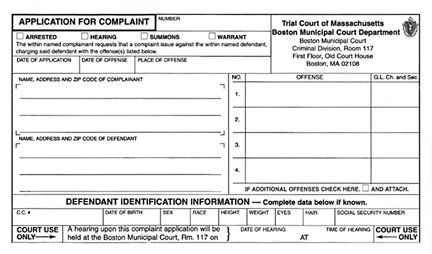Harvard Defenders provides free representation to low-income defendants in criminal show-cause hearings before Clerk-Magistrates.

Show-cause hearings occur when the alleged victim of a crime or the police file an Application for a Criminal Complaint with the court. After an application has been filed, the court will send the defendant a notice in the mail requesting him or her to appear before a clerk-magistrate in a criminal show-cause hearing. The show-cause hearing may also be called a magistrate’s hearing or a criminal complaint hearing. At a show-cause hearing, the complaining party must produce evidence demonstrating “probable cause” that the defendant committed the crime.
The hearing has three possible outcomes: 1) the complaint is dismissed, 2) the complaint is issued, or 3) the complaint is continued.
- If the complaining party fails to show probable cause, the complaint will be dismissed. This means that no charges will be filed against the defendant and neither the application nor will the hearing outcome appear on the defendant’s criminal record.
- If probable cause is shown, the clerk-magistrate may decide that the complaint be issued. If the complaint is issued, the defendant will be arraigned in the district court. At arraignment, the defendant will be formally charged with a crime and may be provided court-appointed counsel if he or she is financially eligible. Issuance of the complaint is not a determination of guilt or innocence, but the charges will appear on the defendant’s criminal record.
- A finding of probable cause does not guarantee the complaint will be issued. Instead, the clerk-magistrate may decide that the complaint be continued. This means the clerk-magistrate will hold the complaint open for a specified period, typically six months or a year from the hearing date. At the end of the continuance period, the complaint will be automatically dismissed if the defendant complies with the conditions set by the clerk-magistrate. Nothing will appear on the defendant’s record if the complaint is dismissed after the continuance period.
